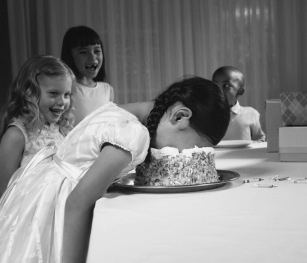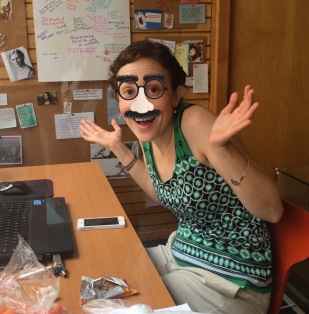Welcome to the Future.
To say it’s been a busy ten weeks since I announced the launch of my SLAM spinoff project, The Future Is Female Festival, would be an understatement. So for anyone wondering why there’s been so much radio silence from me as a writer, a Tweeter, a friend, a human—here’s why:
On March 1st, the Future will arrive in the form of an amazing, more-than-I-ever-could’ve-dreamed-of, fierce, loud, unstoppable festival of new work by over 140 women that will reach 2,000 audience members. The momentum and the excitement is palpable. With twenty-seven festival outposts in eighteen cities from coast to coast and Canada, the future is looking pretty darn female indeed. (Even Hillary still says so.)
It’s so exciting that I want to say it all again and end every sentence with exclamation points, or put the little clapping emoji between each word.
But getting to the point where we’re ready for clapping emojis has not been easy, and here is the singular biggest lesson I have learned in the process: Be the Hot Dog Princess you want to see in the world.
No, really.

In case you don’t remember it from last summer, the Hot Dog Princess was the viral photo of a young girl who dressed up for “Princess Day” at dance class as…you guessed it…a hot dog. Shedding all convention, while the other girls portrayed variations on Disney movies, one little girl did what her heart told her to do, and came as a hot dog.
Being the Hot Dog Princess you want to see in the world is more than just being the change you want to see in the world—it’s an extra level of bravery, boldness, and commitment. And in a world where women are 51 percent of the population but only make up about 20 percent of produced work in theatre and TV, and where even the most qualified and dedicated of women still cannot shatter glass ceilings, producing this festival has reinforced to me that indeed, the best way to create the type of change you want is to roll up your sleeves and make it happen. In life, you will be offered lots of princess outfits, but if you want the hot dog costume, you have to bring it yourself.
Being the Hot Dog Princess you want to see in the world is more than just being the change you want to see in the world—it’s an extra level of bravery, boldness, and commitment. In life, you will be offered lots of princess outfits, but if you want the hot dog costume, you have to bring it yourself.
In creating this festival, one of my goals was to do something that would reach beyond the echo chamber of my big liberal city’s theatre scene. I feared at the outset that we wouldn’t succeed, but I was pleased to find that I was quickly proven wrong. In fact, it was primarily small towns and “red states” that signed up first. My team and I ended up having to scout for participants in most of the major theatre enclaves, but the opposite was true for the more remote locations, who mostly signed up quickly and without hesitation, making up a full third of the total outposts. What’s more, many of the groups in smaller towns were artists who were coming together to make this their very first show or a part of an inaugural season, showing me it’s true that if you build it, they will come.
I also learned it’s true that if you build it, it will be hard and it will not make you like producing any more than you already do, which is to say, not very much. I produced a few short play showcases here in NYC with friends through a school club while we were undergrads. And that was hard, and taught me that I don’t love producing. And I’ve self-produced a handful of my own works within larger festivals, and that was hard too, and reaffirmed to me that I don’t love producing.
This project was each of those experiences times twenty-seven, and I knew full well going into it that I probably was not going to uncover a lost passion for being a producer. It helped a lot that behind this particular endeavor was a cause that meant a great deal to me, and I certainly could not have put together a festival of this scale on a volunteer basis for something I didn’t care about deeply. And despite the challenges and daunting To Do Lists, it definitely has brought me satisfaction and a needed sense of purpose in a time of fear and uncertainty, and ultimately I am grateful for it. You know how some people respond to a breakup by busying themselves with three days a week at spinning class and crocheting blankets for all their friends? I respond to a fascist, racist, sexist, xenophobic demagogue becoming president by busying myself with producing a nationwide theatre festival.
You know how some people respond to a breakup by busying themselves with three days a week at spinning class and crocheting blankets for all their friends? I respond to a fascist, racist, sexist, xenophobic demagogue becoming president by busying myself with producing a nationwide theatre festival.
For those who are still interested in getting involved, you can sign up at almost any time throughout March to host an informal “pop-up” outpost of the festival using a provided folder of submitted plays, to create a reading of any scale. Wanna invite over five friends, crack open a bottle of wine, and read some plays aloud about women’s futures? Congrats! You just amplified the message of this festival. (Quick shout out to my mom, who loves “girl power” and was the very first person to sign up. Heart explosion.)
You can also, of course, go support one of the twenty-seven amazing shows. Check out the Festival Calendar and Festival Map to find one near you. Most benefit a charity, or offer free or pay-what-you-can tickets. A few even include or will feature the work of young women, teens, or college students; perhaps truly the most “future” of all.
Those in NYC can also join us for the festival kick off on Friday, March 3rd at our celebratory Flagship Outpost, featuring short work by incredible, award-winning women: Sara Cooper, Georgina Escobar, Amina Henry, Geraldine Inoa, Winter Miller, Riti Sachdeva, Caridad Svich, and myself, humbly offered alongside these awesome women.
Lastly, my profound thanks are owed to two truly indispensible women who have made this all possible by volunteering with me these last few months: My Co-Producer Lauren Orkus, and Social Media Manager Sarah Cosgrove. Their unwavering dedication to making this festival a huge success tells me that women undoubtedly are the key if you want to get shit done.
In this dark age we have entered into, in which facts can be “alternative,” and families are separated from each other at airports, and walls threaten to divide neighbors, I hope you will join us for this glimmer of hope. See a show in your area, host a pop-up outpost, spread the word, and hashtag with us on Facebook and Twitter: #TheFutureIsFemaleFestival #WomensFuturesMonth.
Onwards!
Originally published on HowlRound.

 And that’s why today, I am launching a new project, a spinoff of the work I am doing with SLAM (which will continue onwards itself, too), in which I hope to further the voice and visibility of women from all backgrounds in a new way. Until now, Submitting Like A Man
And that’s why today, I am launching a new project, a spinoff of the work I am doing with SLAM (which will continue onwards itself, too), in which I hope to further the voice and visibility of women from all backgrounds in a new way. Until now, Submitting Like A Man
 And if there’s one thing I’ve learned this summer, it’s that we desperately, direly need more stories like this—stories that show women as more than sex objects, more than romantic interests, more than airheads, more than nameless forgotten supporting roles. Women
And if there’s one thing I’ve learned this summer, it’s that we desperately, direly need more stories like this—stories that show women as more than sex objects, more than romantic interests, more than airheads, more than nameless forgotten supporting roles. Women 


